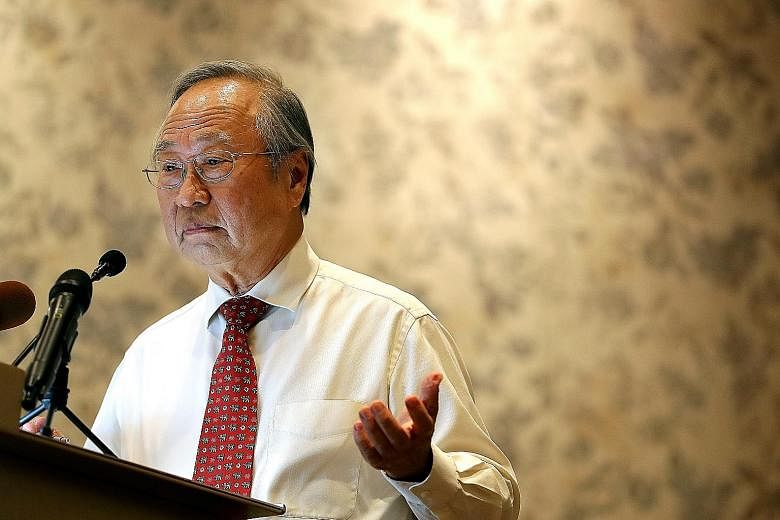The High Court ruled yesterday that Parliament has the right to start counting from the term of former president Wee Kim Wee for the purposes of reserving the upcoming presidential election for Malay candidates.
The reason is that the Constitution does not restrict Parliament to consider only presidents that are elected by Singapore citizens when deciding the timing of an election for a racial group, said Justice Quentin Loh in his judgment.
The Constitution also allows the term of a president elected by Parliament, in this case Mr Wee, to be included in the five terms needed to trigger a reserved election.
Justice Loh made this key point yesterday when dismissing a legal challenge brought by former presidential candidate Tan Cheng Bock on the timing and basis of the reserved presidential election for Malays in September. "From the perspective of ensuring multi- racial representation in the presidency... it makes no difference whether the president was elected by the electorate or by Parliament," he said in a 65-page judgment.
Changes to the Constitution were passed last year to allow for elections to be reserved for candidates from a particular community, if no one from that community has been president in the past five terms.
The Government counted the first of the five terms as Mr Wee's term, as he was in office when the elected presidency took effect in 1991. There have been four other terms since, ending with current President Tony Tan Keng Yam.
Dr Tan Cheng Bock said this was unconstitutional, and that the reserved election should take place in 2023 at the earliest and not this year. His lawyer, Senior Counsel Chelva Retnam Rajah, said Mr Wee's term should not be counted. He cited parts of the Constitution that referred to the president as someone elected by the citizens and serving a six-year term.
Mr Wee, he said, was elected by Parliament and served two four-year terms.
This means Parliament can start its count only from the term of Mr Ong Teng Cheong, the first popularly elected president, he added.
Deputy Attorney-General Hri Kumar Nair, representing the Government, argued that the articles in the Constitution on the reserved election did not specifically exclude presidents elected by Parliament.
This means Parliament has "full discretion" to take into account Mr Wee's term, Mr Hri Kumar added.
Justice Loh ruled that the Constitution does not specify that only a popularly elected president can be considered in determining when an election should be reserved.
While the Constitution "reflects our prevailing constitutional arrangements at any given time", the overarching definition of "president" in Article 2 has not changed since it was included in 1980, he said. This definitionspecifies the term "president" means any person elected president under the Constitution.
Justice Loh noted the definition was retained through two major constitutional changes to the elected presidency in 1991 and this year. He said: "The fact that Parliament retained the definition... must be that the definition was of utility and valid because it would include presidents elected by Parliament.
"Otherwise, all the presidents before President Wee would no longer be presidents 'elected under this Constitution'...this would mean that all their acts, including all the Acts of Parliament to which they assented, would fall away."
Ultimately, Parliament is free to start the count from Mr Ong, any president after Mr Ong, as well as Mr Wee, he said, and added: "Parliament's choice of the first term is a policy decision which falls outside the remit of the courts."
The judge also noted that when the elected presidency took effect in 1991, the law provided for Mr Wee to continue for the rest of his term, and vested in him the powers and duties of an elected president. This was similar to a provision made in 1965, after independence, for Yang di-Pertuan Negara Yusof Ishak to continue as president, he said.
Mr Rajah argued that the court should favour an interpretation of the law that would delay the reserved election as far as possible, because it encroaches on Singaporeans' fundamental rights to run in a presidential election.

Justice Loh said contesting the election is not a fundamental right akin to freedom of speech and religion, among others, which are enshrined in the Constitution.
Due to the president's important role, the Constitution specifies stringent expertise and experience for people to qualify as a presidential candidate, which not everyone can meet. In this light, the right to stand for the election is plainly very different from the fundamental rights in the Constitution, he said.
The Attorney-General's Chambers did not ask for legal costs. Mr Hri Kumar said this is because Dr Tan has indicated he will not be pursuing costs.
In a post last night on Facebook, Dr Tan said his lawyers are studying the judgment. "I am, of course, disappointed with the result and will announce whether I will appeal, after this weekend," he said.


